-
 Bitcoin
Bitcoin $108,270.9768
2.07% -
 Ethereum
Ethereum $2,489.8066
2.50% -
 Tether USDt
Tether USDt $1.0004
0.01% -
 XRP
XRP $2.2035
0.66% -
 BNB
BNB $661.6608
2.32% -
 Solana
Solana $150.6425
2.13% -
 USDC
USDC $0.9999
-0.01% -
 TRON
TRON $0.2810
0.90% -
 Dogecoin
Dogecoin $0.1645
3.05% -
 Cardano
Cardano $0.5743
4.91% -
 Hyperliquid
Hyperliquid $38.8419
-0.15% -
 Bitcoin Cash
Bitcoin Cash $504.3134
-2.64% -
 Sui
Sui $2.8096
4.35% -
 Chainlink
Chainlink $13.3095
2.21% -
 UNUS SED LEO
UNUS SED LEO $8.9469
0.33% -
 Avalanche
Avalanche $17.9231
3.93% -
 Stellar
Stellar $0.2340
0.74% -
 Toncoin
Toncoin $2.8458
3.21% -
 Shiba Inu
Shiba Inu $0.0...01158
3.47% -
 Litecoin
Litecoin $86.0738
1.94% -
 Hedera
Hedera $0.1507
2.99% -
 Monero
Monero $319.8544
2.31% -
 Polkadot
Polkadot $3.4081
1.95% -
 Dai
Dai $1.0000
0.01% -
 Bitget Token
Bitget Token $4.5645
0.91% -
 Ethena USDe
Ethena USDe $1.0002
0.00% -
 Uniswap
Uniswap $7.2959
5.27% -
 Aave
Aave $272.4623
2.90% -
 Pepe
Pepe $0.0...09680
2.96% -
 Pi
Pi $0.4955
0.78%
How to ensure the security of the private key of the Ethereum wallet?
Secure your Ethereum private key using hardware wallets, strong passwords, and regular backups. Avoid phishing scams and keep your software updated to protect your cryptocurrency.
Mar 15, 2025 at 01:31 pm
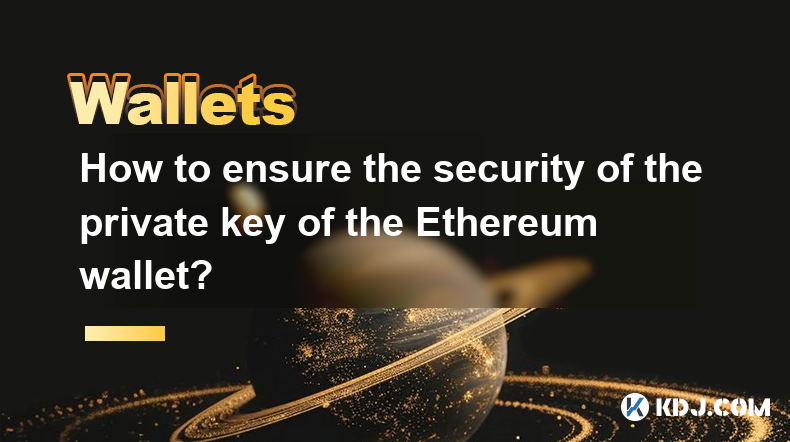
Key Points:
- Understanding the critical role of private keys in Ethereum.
- Exploring various methods for securely storing private keys.
- Implementing best practices to protect against common threats.
- Utilizing hardware wallets for enhanced security.
- Regularly reviewing and updating security measures.
How to Ensure the Security of the Private Key of the Ethereum Wallet?
Ethereum, a leading blockchain platform, relies heavily on the security of private keys. These keys are essentially passwords granting access to your Ethereum wallet and its associated funds. Losing or compromising your private key means losing access to your cryptocurrency. This article delves into various strategies to safeguard your private keys.
Understanding the significance of private key security is paramount. Your private key is the sole means of authorizing transactions from your Ethereum wallet. Without it, your ETH and any other ERC-20 tokens held within are irretrievably lost. This underscores the need for robust security measures.
One of the most common and effective methods is using a hardware wallet. These dedicated devices store your private keys offline, significantly reducing the risk of hacking or malware attacks. Hardware wallets offer an extra layer of security compared to software solutions. Leading brands offer various levels of security features.
Software wallets, while convenient, present a greater security risk. They store your private keys on your computer or mobile device, making them vulnerable to malware, phishing attacks, and device theft. If using a software wallet, ensure it's from a reputable provider and keep your device updated with the latest security patches.
Never share your private key with anyone. Legitimate services will never request your private key. Be wary of phishing attempts disguised as official websites or emails. Always verify the URL and sender before entering any sensitive information.
Employ strong and unique passwords for your wallet and any associated accounts. Avoid using easily guessable passwords or reusing passwords across multiple platforms. Consider using a password manager to generate and store complex passwords securely.
Regularly back up your private keys, but store them securely offline. This backup is crucial in case your primary wallet is compromised or lost. Employ multiple backup methods and consider using a secure, encrypted storage solution. Never store your backups digitally on a device connected to the internet.
Protecting your computer and mobile devices is essential. Install reputable antivirus software and keep it updated. Avoid downloading files from untrusted sources, and be cautious when clicking on links in emails or messages. Enable two-factor authentication (2FA) wherever possible for added protection.
Consider using a paper wallet. This involves generating your private key offline and printing it on paper. While seemingly archaic, it offers excellent security against digital attacks. However, physical security becomes paramount; store the paper wallet securely and safely.
Stay informed about the latest security threats and best practices. The cryptocurrency landscape is constantly evolving, and staying up-to-date is vital for maintaining the security of your private keys. Follow reputable security blogs and forums for the latest information.
Frequently Asked Questions:
Q: What is a private key in the context of Ethereum?
A: A private key is a secret cryptographic code that allows you to access and control your Ethereum wallet and the cryptocurrency within it. It's crucial to keep it secure.
Q: What are the risks of losing my private key?
A: Losing your private key means irreversible loss of access to your Ethereum wallet and all associated funds. There's no recovery process.
Q: Are hardware wallets always the best option?
A: While hardware wallets offer the highest level of security, they may not be the most convenient for everyone. The best option depends on your technical skills and risk tolerance.
Q: Can I recover my private key if I lose it?
A: No, private keys cannot be recovered. Therefore, robust security measures are essential to prevent loss or compromise.
Q: What are some signs of a phishing attempt related to my Ethereum private key?
A: Phishing attempts often involve emails or websites mimicking legitimate services, requesting your private key or seed phrase. Always verify the sender and URL before interacting.
Q: How often should I back up my private keys?
A: Regular backups are recommended. The frequency depends on your risk tolerance and how frequently you use your wallet. Consider backing up after any significant transaction or software update.
Q: What should I do if I suspect my private key has been compromised?
A: Immediately change your passwords, contact your exchange or wallet provider (if applicable), and monitor your accounts closely for unauthorized activity.
Disclaimer:info@kdj.com
The information provided is not trading advice. kdj.com does not assume any responsibility for any investments made based on the information provided in this article. Cryptocurrencies are highly volatile and it is highly recommended that you invest with caution after thorough research!
If you believe that the content used on this website infringes your copyright, please contact us immediately (info@kdj.com) and we will delete it promptly.
- XRP Price Targets $2.40 After Descending Channel Breakout: Is $40 Next?
- 2025-07-03 08:50:12
- All Blacks' Loose Forward Conundrum: New Faces and Familiar Battles
- 2025-07-03 08:30:12
- Bitcoin's Wild Ride: Open Interest, Institutional Bets, and Billions on the Line
- 2025-07-03 08:30:12
- Bitcoin, Strategy, & Profit: MSTR's Crypto Playbook and Trump's Digital Diversification
- 2025-07-03 08:50:12
- INJ Price Bull Rally: Smashing Long-Term Resistance – Can It Last?
- 2025-07-03 09:10:12
- Robinhood, OpenAI, and Wallet History: A Tokenized Tale of Intrigue
- 2025-07-03 09:10:12
Related knowledge

Does Phantom wallet offer two-factor authentication (2FA)?
Jul 03,2025 at 09:00am
Understanding Phantom Wallet and Its Security FeaturesPhantom wallet is a widely used non-custodial cryptocurrency wallet that supports the Solana blockchain. It allows users to store, send, receive, and interact with decentralized applications (dApps) seamlessly. As security is a top priority for any crypto wallet user, security features like two-facto...

What is "rent" on Solana and how does it affect my Phantom wallet?
Jul 02,2025 at 08:35pm
Understanding 'Rent' on SolanaIn the context of Solana, the term 'rent' refers to a storage fee that users pay for maintaining data on the blockchain. Unlike Ethereum, where storage costs are paid once via gas fees during contract deployment, Solana implements a recurring cost model to ensure efficient usage of network resources. This means that any acc...
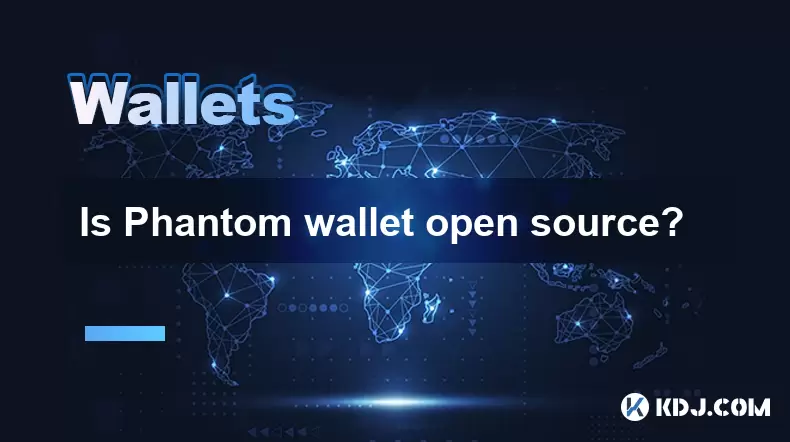
Is Phantom wallet open source?
Jul 03,2025 at 12:29am
What is Phantom Wallet?Phantom wallet is a non-custodial cryptocurrency wallet primarily designed for the Solana blockchain. It allows users to store, send, receive, and interact with decentralized applications (dApps) on the Solana network. The wallet is available as a browser extension and mobile application, offering a seamless experience for both be...
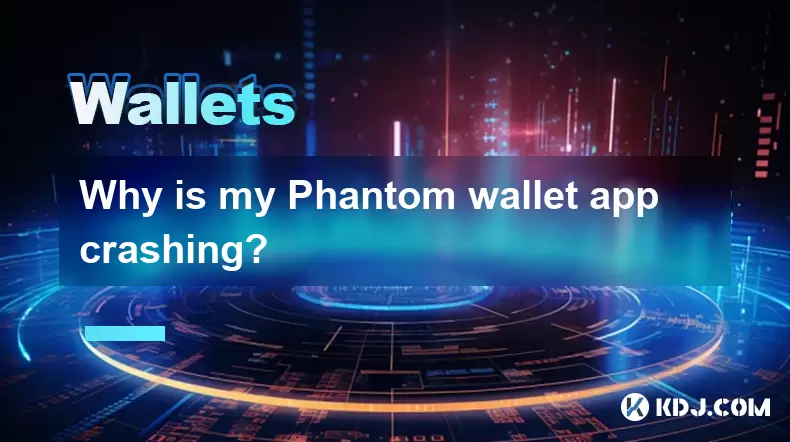
Why is my Phantom wallet app crashing?
Jul 02,2025 at 07:35pm
Understanding Phantom Wallet App CrashesIf you're experiencing issues with the Phantom wallet app crashing, you're not alone. Many users have reported similar problems, especially during high network activity or after recent updates. Phantom is a popular Solana-based wallet that allows users to store, send, and receive SOL tokens as well as interact wit...
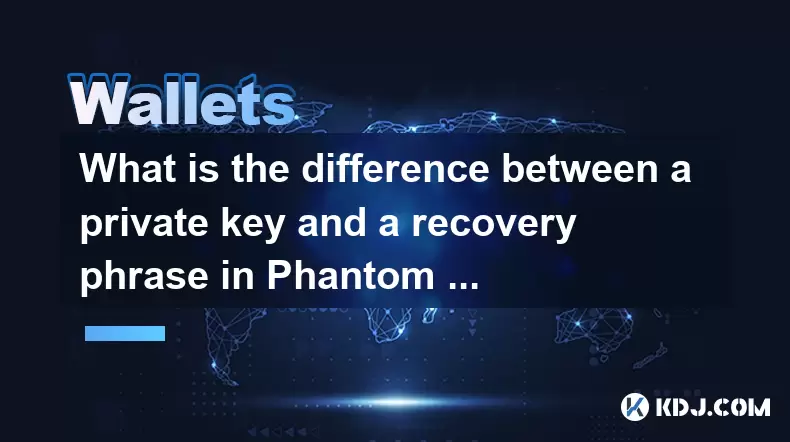
What is the difference between a private key and a recovery phrase in Phantom wallet?
Jul 02,2025 at 09:57am
Understanding the Basics of Phantom WalletPhantom wallet is a non-custodial digital wallet primarily used for interacting with the Solana blockchain. It allows users to store, send, and receive SOL tokens and other digital assets like NFTs. Non-custodial means that the user retains full control over their private keys and recovery phrases. Understanding...
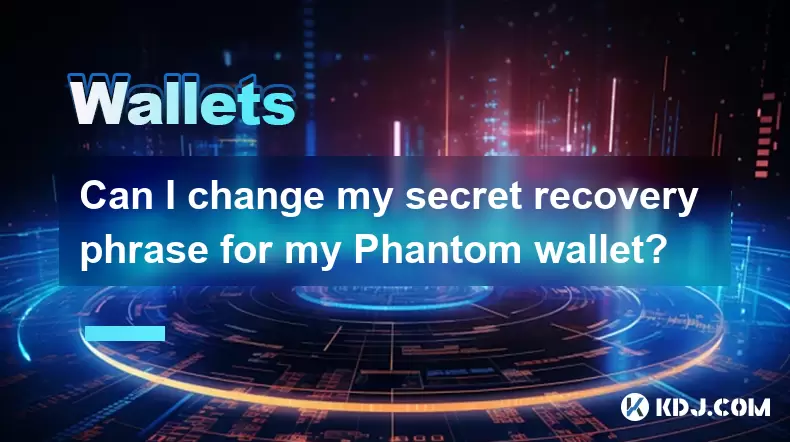
Can I change my secret recovery phrase for my Phantom wallet?
Jul 02,2025 at 12:07pm
Understanding the Role of a Secret Recovery PhraseThe secret recovery phrase, often referred to as a seed phrase, is a critical component in managing cryptocurrency wallets like Phantom. It serves as a backup mechanism that allows users to recover their wallet and associated assets if they lose access to their device or password. Typically, this phrase ...

Does Phantom wallet offer two-factor authentication (2FA)?
Jul 03,2025 at 09:00am
Understanding Phantom Wallet and Its Security FeaturesPhantom wallet is a widely used non-custodial cryptocurrency wallet that supports the Solana blockchain. It allows users to store, send, receive, and interact with decentralized applications (dApps) seamlessly. As security is a top priority for any crypto wallet user, security features like two-facto...

What is "rent" on Solana and how does it affect my Phantom wallet?
Jul 02,2025 at 08:35pm
Understanding 'Rent' on SolanaIn the context of Solana, the term 'rent' refers to a storage fee that users pay for maintaining data on the blockchain. Unlike Ethereum, where storage costs are paid once via gas fees during contract deployment, Solana implements a recurring cost model to ensure efficient usage of network resources. This means that any acc...

Is Phantom wallet open source?
Jul 03,2025 at 12:29am
What is Phantom Wallet?Phantom wallet is a non-custodial cryptocurrency wallet primarily designed for the Solana blockchain. It allows users to store, send, receive, and interact with decentralized applications (dApps) on the Solana network. The wallet is available as a browser extension and mobile application, offering a seamless experience for both be...

Why is my Phantom wallet app crashing?
Jul 02,2025 at 07:35pm
Understanding Phantom Wallet App CrashesIf you're experiencing issues with the Phantom wallet app crashing, you're not alone. Many users have reported similar problems, especially during high network activity or after recent updates. Phantom is a popular Solana-based wallet that allows users to store, send, and receive SOL tokens as well as interact wit...

What is the difference between a private key and a recovery phrase in Phantom wallet?
Jul 02,2025 at 09:57am
Understanding the Basics of Phantom WalletPhantom wallet is a non-custodial digital wallet primarily used for interacting with the Solana blockchain. It allows users to store, send, and receive SOL tokens and other digital assets like NFTs. Non-custodial means that the user retains full control over their private keys and recovery phrases. Understanding...

Can I change my secret recovery phrase for my Phantom wallet?
Jul 02,2025 at 12:07pm
Understanding the Role of a Secret Recovery PhraseThe secret recovery phrase, often referred to as a seed phrase, is a critical component in managing cryptocurrency wallets like Phantom. It serves as a backup mechanism that allows users to recover their wallet and associated assets if they lose access to their device or password. Typically, this phrase ...
See all articles

























































































